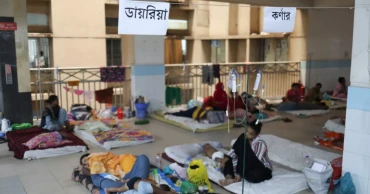Fever
Overwhelming heat exacerbates health challenges across Dhaka, as children bear the brunt of the impact
A prolonged heatwave has significantly increased patient admissions in hospitals throughout Dhaka, with the city's medical facilities struggling to cope with the additional burden.
Most admissions involve heatstroke, fever, cold, diarrhoea, and pneumonia, ailments that disproportionately affect children.
Patients and their families face severe heat within hospital premises as well, worsening conditions for those already suffering. Many hospitals, including Dhaka Medical College Hospital (DMCH), have reported a surge in cases since Eid, with no space left even on the floors, forcing many to resort to makeshift solutions like hand fans or small table fans.
Abul Malek, from Dhaka’s Nodda area, was admitted at DMCH. His son Nadim told UNB, "The heat is unbearable, and the lack of available beds has left my father to receive treatment on the floor. The situation would have been somewhat manageable with lower temperatures."
Severe heatwave in Khulna: Day labourers forced to work in dangerous conditions
In response to the dire situation, Brigadier General Md. Asaduzzaman, Director of Dhaka Medical College Hospital, emphasized their efforts to improve conditions. "We're swapping out all malfunctioning fans and adding new ones wherever possible. Additionally, technicians have been instructed to ensure separate lines for fans and lights to prevent electrical issues."
Patient admissions have reportedly doubled at Kurmitola General Hospital, Mugda Medical College and Hospital and Dhaka Shishu Hospital as well since Eid. The majority of these patients are suffering from diarrhoea and pneumonia. The emergency and outpatient medicine departments are under the most pressure, facing the highest patient load.
Professor Dr. Farid Ahmed, Head of General Pediatrics at Dhaka Shishu Hospital, highlighted the impact of the heatwave on young patients: "With the heat continuing, children are particularly vulnerable to heatstroke and other diseases, which have led to an alarming rate of hospital admissions. We are struggling to provide enough beds."
Public health expert and former director of Disease Control at Directorate General of Health Services, Professor Dr. Be-Nazir Ahmed, stressed the severity of the situation, noting, "The current heatwave is unbearable. It not only raises the risk of cholera but also heightens the likelihood of other diseases. Extreme temperatures disrupt normal bodily functions, posing life-threatening risks and increasing susceptibility to various infections."
Fear of fruit failure grips mango growers in Chapainawabganj as heatwave Intensifies
The authorities have urged the public to stay indoors unless absolutely necessary and avoid direct exposure to extreme temperatures. With schools reopening, there is an increased concern for children's safety, necessitating heightened awareness and preventive measures against foodborne diseases and dehydration.
This crisis underscores the pressing need for improved infrastructure and preparedness to handle climate-induced health emergencies, particularly for the most vulnerable populations such as children.
1 year ago
Two baby sisters succumb to mysterious virus after ‘eating unwashed plums’
In a heart-wrenching incident in Rajshahi, two baby sisters passed away within four days of each other after contracting an unidentified virus, as reported by medical professionals.
The almost two-year-old younger sister, Muntaha Marisha, tragically died en route to the hospital last Wednesday, while her elder sister, four years and nine months old Muftaul Mashiya, passed away on Saturday afternoon during treatment at Rajshahi Medical College Hospital (RMCH). The girls were the daughters of Manjur Rahman, a mathematics teacher at Rajshahi Cadet College, residing with his family in the college's quarters in Sarda.
Physicians at RMCH initially suspected a viral infection but awaited confirmation pending laboratory results from samples sent to Dhaka for analysis. The girls' parents, Manjur and Poly Khatun, have been placed in RMCH's isolation ward.
Read: Nipah Virus: Don’t Consume This If You Want to Be Safe
Dr. Abu Hena Mostafa Kamal, an ICU physician at RMCH, mentioned that there is a suspicion of the Nipah virus, although the girls' parents refuted this possibility.
He noted that the children had consumed unwashed plums, which could potentially be linked to the Nipah virus or another viral agent. The definitive cause of death awaits the results of the samples sent for testing.
Poly Khatun recounted the events leading to their illness, stating that their domestic help had given the girls unwashed plums from a tree on campus on the morning of February 13. The following day, Marisha developed a fever, exhibited repeated vomiting, and showed signs of severe dehydration. Despite being rushed to the Rajshahi Combined Military Hospital (CMH), Marisha died en route. Mashiya exhibited similar symptoms the next morning and, after initial treatment at the Upazila Health Complex and CMH, was transferred to RMCH, where she was admitted to the ICU.
Read: Nipah virus: Two patients from Manikganj die in Dhaka
Both sisters displayed black spots on their bodies before their deaths, a symptom noted by their mother.
RMCH physician Mostafa Kamal clarified that there have been no reported deaths from the Nipah virus in Rajshahi this year. However, he confirmed that a viral infection caused the sisters' deaths, emphasizing the rapid progression of their illness and the limited opportunity for treatment. The parents remain in hospital isolation as precautions continue.
Read more: Ancient viruses can help fight cancer, scientists say
2 years ago
Food, Drinks during Dengue: What to consume, what to avoid
Every year a huge population is affected by Dengue fever. The main risk factor of dengue is the reduction of blood’s platelet level to a great extent that it could be fatal. The body requires sufficient vitamins, minerals, and protein to produce platelets. Patients diagnosed with dengue fever, need to consume the right diet for a fast recovery from dengue fever. Let’s take a look at the recommended foods and drinks during dengue fever.
Best Foods and Drinks for Dengue
Papaya leaves
Different studies have shown that the extract of the leaves of papaya is used as a complementary treatment for disorders of platelet function. Juice of Papaya leaves can help in increasing the platelet count in blood and boosts the immunity of your body.
Enzymes like papain and chymopapain are available in papaya extracts that prevent bloating and other digestive disorders. Papaya leaves juice is considered to be one of the best food items to increase platelets in the blood of patients suffering from dengue fever.
Read Dengue Fever: Symptoms, diagnosis, treatment, prevention
Vegetables
Dengue patients should eat vegetables like spinach, pumpkin, paprika, carrot, watercress, celery, broccoli, and beetroot to trigger the platelet levels in the blood. These vegetables help you purify your body. Make sure the vegetables are properly washed and cleaned before eating or cooking.
Spinach is enriched with protein and Vitamin K. These vitamins participate in the metabolism of coagulation factors and help to reduce the risk of excessive bleeding.
Take pumpkin with seeds, as they have amino acids and vitamins essential for platelet formation. If you regularly eat pumpkin, including seeds, it improves the absorption of proteins and vitamin A. These nutrients participate in the production of these small cells.
Read Why do Mosquitoes bite me so much?
Beetroot is rich in antioxidants that help prevent platelet reduction due to the effects of free radicals. It has vitamins A, C, and K and essential minerals, that help prevent the deterioration of blood vessels and the development of circulatory problems. By drinking beetroot juice regularly Dengue patients can strengthen their body's immunity.
Fruits
To increase the platelet count in the blood Dengue patients need both Vitamin C and Vitamin K. So while recovering from Dengue, the patients need to eat citrus fruits like lemon, orange, kiwi, or tangerines, and other fruits like strawberries, raspberries, tomatoes, or currants also.
Green Coconut water
Green coconut water is always best and it has huge health benefits. It is also a popular and effective drink to raise platelet levels. Coconut water bestows vitamins A, B, and C, and minerals, calcium, potassium, magnesium, iron, and phosphorus also.
Read Conjunctivitis: Causes, Symptoms, Treatment and Prevention
Besides, it is perfect for dengue patients as they experience dehydration as a result of high fever, diarrhea, anorexia, vomiting, and nausea during the febrile phase (days 4-6).
Nuts
As nuts and almonds are good sources of proteins and proteins are essential for normal platelet count, Dengue patients can take sufficient amounts of nuts during dengue fever.
Aloe Vera
Aloe Vera is full of nutrients including calcium, magnesium, phosphorus, potassium, zinc, sodium, copper, and vitamins C, E, and B.
Read 10 houseplants that are bad for your pets
Therefore, aloe vera juice has huge medicinal applications and it is an excellent ally in taking care of cardiovascular health and promoting platelet production in blood. Dengue patients can keep this food in their diet.
Yogurt
Yogurt is known for having probiotics-active bacteria. These active bacteria are very useful for keeping the intestines free of harmful germs and bacteria that are capable of causing diseases.
Dengue patients need to take Yogurt regularly to keep their defenses high. But not more than 150 grams of yogurt a day to get its healing benefits.
Read How to entertain an unwell child without screen time
Chicken Soup
Scientific evidence is available that chicken soup is great to stop the symptoms of colds and flu. Chicken soup is rich in Vitamin B12, Vitamin C, Antioxidants, Vitamin A, Vitamin D, Vitamin E, Vitamin K, and Carnosine.
These nutrients are essential to stimulating the defenses so that healing is carried out quickly. It will also help Dengue patients stay hydrated and raise the temperature of the airways, which is very effective in loosening mucus.
Green tea
Green tea is called one of the most popular healing drinks. It has a high content of polyphenols, very valuable anti-oxidant compounds with immunostimulatory effects.
Read Best foods for expecting mothers
A scientific study shows that a particular type of phenolic compound, called catechins, has the ability to eliminate some types of influenza viruses.
So, green tea should be included in the Dengue fever diet.
Neem Leaves
Neem leaves are blessed with chemicals such as Nimbin and Nimbidin that have anti-microbial, anti-inflammatory, and antipyretic properties. Research shows that these leaves have positive results in treating dengue by increasing blood platelets and white blood cell count.
Read How to Apply for Indian Medical Visa from Bangladesh
Foods and Drinks to Avoid while Recovering from Dengue Fever
Patients need to avoid certain foods that contain salicylates when infected with dengue fever. These types of food make blood thinner and slow clotting.
Non-vegetarian Foods
During the infection of dengue fever the human body becomes weak, the digestive system slows down, and non-vegetarian food does not easily digest. Therefore, while recovering from dengue fever, patients must strictly avoid non-vegetarian food.
Fried or Oily Foods
Dengue patients should also avoid oily foods burgers, pizza, potato chips, fried chicken, doughnuts, etc as these foods contain an increased amount of fat and can lead to high blood pressure and cholesterol.
Read How to Stay Physically Active during Pregnancy
Spicy Foods
Don’t take spicy foods at all during dengue fever as they can cause acid accumulation in the stomach and result in ulcers and damage to the wall. Eating these types of food during dengue infection may hinder the recovery process.
Caffeinated Beverages
Dengue fever causes dehydration and hence Dengue patients must drink plenty of fluids. Remember, caffeine, i.e. caffeinated beverages can revive the gastronomical tract, leading to nausea and diarrhea.
Besides, this type of beverage can increase the symptoms and production of stomach acid and cause rapid heart rate, and muscle breakdown which can hinder the dengue recovery process.
Read Should You See a Therapist? 8 Surefire Signs You Need Help
Bottom Line
Dengue is a curable disease but a little carelessness can cause serious issues and lead to death also. Hence, you need to be conscious about taking food and drinks. We have discussed here the foods and drinks to eat and avoid during dengue fever for quick recovery. Hope it helps!
3 years ago
Dengue Fever: Symptoms, diagnosis, treatment, prevention
The Aedes mosquito causes dengue fever. If you are bitten by a mosquito that carries the dengue virus, you will get dengue fever. The infection should not be neglected. If Dengue fever progresses to a severe stage, it can threaten life. This article will discuss the symptoms, treatments, home remedies, and preventions for dengue fever.
What is Dengue?
Dengue is a viral infection that is transmitted by the Aedes mosquito. The disease is found in tropical and subtropical regions of the world, and it is estimated that there are over 400 million cases of Dengue each year. The virus that causes Dengue is called DENV, and there are four DENV serotypes. It is possible to be infected four times with the virus.
However, there is no specific treatment for Dengue, but it can be prevented by protecting against mosquito bites. The Aedes mosquito typically lays its eggs in standing water, so removing sources of standing water can help to reduce the risk of dengue transmission.
Read Conjunctivitis: Causes, Symptoms, Treatment and Prevention
Signs of Dengue Fever
There are some symptoms to look for to know whether it is dengue fever or not. Such as feeling cold, loss of appetite, body aches, headache, pain in the eyes, lower back pain, muscle pain, joint pain, rash, fatigue, swollen lymph nodes, and skin-eye redness.
In the first few hours of dengue infection, pain is felt in the legs and joints. Fever can rise very quickly to 104 degrees Fahrenheit. Heart rate and blood pressure are low during this time. A red or pink rash may appear on the face, which then disappears.
High fever and other dengue symptoms last for 2-4 days, and then the body temperature drops rapidly with sweating. Body temperature remains normal for about a day before the second rapid rise in fever, and feels healthy. Later, an itchy rash appears all over the body except the face. The palms of the hands and soles of the feet may be bright red and swollen.
Read How to entertain an unwell child without screen time
Severe Symptoms of Dengue
Sometimes dengue infection is very serious or fatal. It is called severe Dengue. Symptoms of severe Dengue appear 3-7 days after the initial symptoms of Dengue. People who have been infected with Dengue before are at higher risk of severe Dengue.
The main symptoms of severe Dengue are severe abdominal pain, abdominal swelling, vomiting blood, bleeding from the gums, bleeding under the skin, difficulty or rapid breathing, feeling cold or sweating, rapid pulse, and drowsiness/loss of consciousness. If you see the symptoms of severe Dengue, you should go to the emergency department of the hospital without a moment's delay.
How to Diagnose Dengue Fever
If you see any dengue symptoms or have a serious fever, you should consult a registered doctor for further investigations. Not every fever is Dengue. Self-diagnosed for Dengue leaves other common causes of fever, such as pneumonia, urinary tract infection, typhoid, flu, etc., undiagnosed.
Read Best foods for expecting mothers
Patient's signs, symptoms, and physical examination data can help to diagnose the disease. However, results may vary from the first day to the next 10 days of dengue fever in different tests. So, self-testing can be confusing. Therefore, it would be wise to let the doctor understand first.
Doctors initially diagnose Dengue through NS1, CBC, IgG, and IgM. A maximum of Tk. 500 can be charged for the dengue NS1 Antigen test. A maximum of Tk. 400 can be taken for CBC (RBC + WBC + Hematocrit) test. Apart from this, IgG and IgM tests should be done within 500 Takas.
Treatment and Home Remedies of Dengue Fever
There is no specific treatment for dengue fever, but there are ways to ease the symptoms. Pain relievers, rest, and fluids can help to reduce fever and pain. In severe cases, hospitalization may be necessary in order to receive intravenous fluids and close monitoring.
Read Why do Mosquitoes bite me so much?
At the initial stage, take rest and drink plenty of water or liquid food. If the body is hydrated, headaches and muscle pain will be reduced. Drink coconut water, lemon juice, fruit juice, and saline at home.
Paracetamol can be taken to reduce the fever. However, a doctor's consultancy is needed if the patient has heart, liver, and kidney-related complications.
Aspirin, Clofenac, and Ibuprofen-like medicines should not be taken for body pain when suffering from dengue fever. Taking such medicines during Dengue can cause bleeding.
Read How to Apply for Indian Medical Visa from Bangladesh
What not to do
Platelets are no longer a key factor in dengue fever. There is no need to worry about the platelet count. If the platelet count falls below 10,000 or if there is bleeding from any part of the body, platelets or fresh blood can be given if necessary. However, such situations are very rare.
Many people say that eating papaya leaf juice etc. increases platelets. Actually, these have no role. After the fever subsides, platelets begin to grow by themselves after the crisis period has passed. At the end of the fever, the blood pressure may drop, or there may be bleeding from the gums, nose, or rectum. If this is the case, intravenous saline may be needed. In these cases, hospital admission is required.
When to go to the hospital
In the case of Dengue, what kind of treatment to take, staying at home or in a hospital, depends on its type or category. There are three types or categories of dengue fever - 'A,' 'B,' and 'C.' Patients in the first category are normal. They only have a fever. Most dengue patients are in the 'A' category. They do not require hospitalization. Resting at home is enough.
Read Top 10 Bathroom Plants to grow in humid environment of shower
Category 'B' dengue patients may require hospitalization. Certain symptoms, such as abdominal pain, vomiting, diabetes, obesity, pregnancy, congenital problems, and kidney or liver problems, are recommended for hospitalization.
Category 'C' dengue fever is the worst. It can damage the liver, kidneys, and brain. In some cases, an intensive care unit or ICU may be required.
So, you have to follow the doctor's instructions.
Read Motorcycle Accident Prevention: Tips to Reduce the Risk of a Crash
Dengue Fever Season in Bangladesh
Generally, the dengue outbreak occurs from July to October in Bangladesh, as the Aedes mosquito spreads during this period. But we have to be careful throughout the year as in some years; Dengue started in June.
Preventive Measures for Dengue Fever
The Aedes mosquito usually lays its eggs in clear water. So, make sure water does not stay for more than three to five days. This water can accumulate anywhere. Aedes mosquitoes breed in the water collected on the roof of the house or in the flower tub of the balcony, at various points of the building under construction, tires lying on the side of the road, or in other containers.
So, check if there is any stagnant water in any places around the house. Also, use mosquito nets and spray in the house. Additionally, use mosquito repellent cream while going out or staying at home.
Read Should You See a Therapist? 8 Surefire Signs You Need Help
Final Words
In Bangladesh, the Dengue death toll is rising every year. Especially in the cities and towns, many inhabitants are being affected by Dengue fever. Some prevention measures for Dengue can minimize the spread of the disease.
However, all fevers are not Dengue. So, make sure you know the sign and symptoms of Dengue Fever to determine if you have it or not. You may also get affected by viral fever too. So far, we have discussed the diagnosis process of Dengue fever. Proper consultations with doctors are essential to avoid serious medical conditions. If proper treatment for Dengue fever is provided the patient can be cured.
3 years ago
Khaleda Zia suffering from fever
BNP Chairperson Khaleda Zia, who was admitted to Evercare Hospital in the capital over one and a half months ago, has been suffering from fever, the party's Secretary General Mirza Fakhrul Islam Alamgir said Friday.
“She (Khaleda) has been suffering from fever from last (Thursday) night. Doctors are looking into the cause of the sudden fever,” he said.
Speaking at a press conference at the BNP Chairperson’s Gulshan office, the BNP leader also said the party chief has been receiving medicine to recover from the fever alongside other diseases.
Fakhrul said the medical board formed by the hospital wills assess her condition on Friday.
He, however, said the former prime minister's overall health condition is fine as different parameters of her health are in good shape.
The 76-year-old BNP chief, who tested positive for Covid-19 on April 11, was admitted to Evercare Hospital on April 27 for a thorough checkup. She was shifted to the CCU with shortness of breath on May 3.
On April 28, a 10-member medical board, headed by Prof Shahabuddin Talukder, was formed for the treatment of Khaleda at the hospital a day after her admission there.
She tested negative for Covid-19 on May 8 -- 27 days after she had been infected with the virus -- but the BNP chief has been suffering from post-Covid complications.
The BNP chief’s family submitted an application to the government on May 6 seeking permission to send her abroad for advanced treatment but it was turned down as a convicted person cannot avail of such a scope.
Amid the coronavirus outbreak, the government freed Khaleda from jail for six months through an executive order suspending her sentences on March 25 last year.
4 years ago
9 more people die with fever, cold-related problems in Cumilla
Nine people who had been suffering from fever and cold related problems died at Comilla Medical College hospital in the last 24 hours till Thursday morning.
5 years ago
Narail cop dies after submitting sample for Covid test
A police officer in Khulna suffering from cold, fever and breathing problems died undergoing treatment at the Sadar Upazila Health Complex on Tuesday.
5 years ago
6 die in Cumilla with fever, cold-related problems
Six people died with fever and cold-related problems at Cumilla Medical College and Hospital in the last 24 hours till Wednesday morning.
With the new deaths, 127 people have so far died with the same symptoms at the hospital, said its assistant director Dr Sajeda Khatun.
5 years ago
4 die with fever, cold in Cumilla
Four people have died with fever and cold at Cumilla Medical College and Hospital in the last 24 hours till Thursday night.
Dr Sajeda Khatun, assistant director of Cumilla Medical College and Hospital, said two men and two women, who were undergoing treatment at the hospital, died.
A total of 109 people have died at the hospital since April 1. Of them 14 were Covid-19 patients while the 95 people died with fever and cold.
Now, 114 people are taking treatment at the hospital and of them 42 are Covid-19 patients, she said.
5 years ago
Seven suffering from cold, fever die in four districts
A total of seven people suffering from cold, fever and respiratory problems died in Barishal, Jashore, Chandpur and Panchagarh on Friday.
5 years ago





.jpg)

.jpg)
.jpg)
.jpg)





